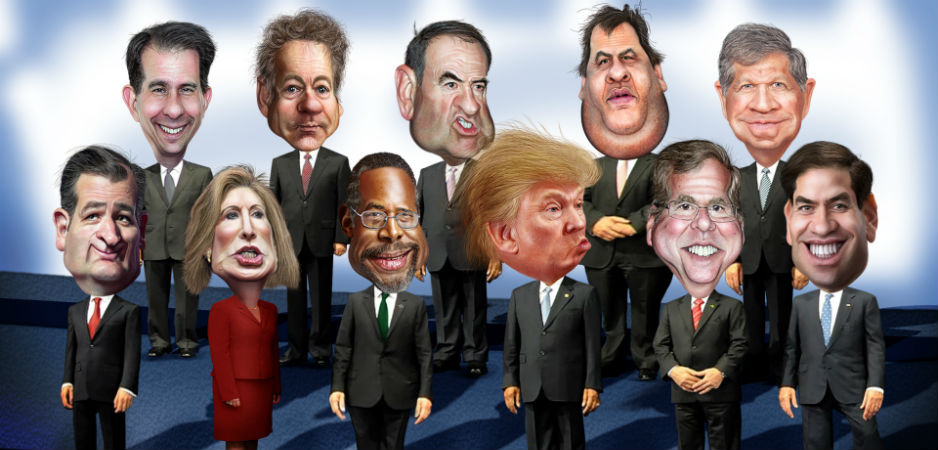Republican presidential candidates try to interpret the US Constitution for political motives, whilst celebrating Scalia’s originalism.
On February 13, the stage of the Republican presidential debate in South Carolina was rife with hypocrisy, as candidates celebrated Justice Antonin Scalia’s originalism and commitment to the US Constitution while many of them, in the same breaths, denied Barack Obama’s right to nominate a new justice in the waning months of his presidency.
The Constitution is clear on the issue: As per Article 2, the president has the right, and the duty, to nominate new Supreme Court justices when vacancies occur. The Senate then has the right, and the duty, to consider the president’s nomination and confirm or deny it. The president’s nomination first comes before the Senate Judiciary Committee, whose 20 members decide whether to send a candidate for consideration before the full Senate.
As Republican presidential hopefuls debated each other just hours after news had broken of Scalia’s death, they struggled to defend their claims that President Obama should not fulfill his duty to nominate a new justice and, instead, leave the job to the next US president. Obama’s successor will not take office until January 2017, and the process of nominating and confirming a Supreme Court justice takes months. Under this plan, Scalia’s seat on the court would remain vacant until at least spring 2017, over a year from now.
Of course, Republican presidential hopefuls jump at every opportunity to attack and obstruct President Obama, as he has long been cast as the antichrist among their base of conservative Americans. It’s one thing to attack Obama and decry his devilish liberal policies; it’s another to try to interpret the Constitution conveniently so as to deny him the right to fulfill one of the most basic and uncontested rights of the president—one that every person on the stage would vehemently defend were he in Obama’s position.
To attempt to interpret the Constitution for political purposes while touting Scalia’s faithfulness to the document as written by our Founding Fathers is sweet irony. Scalia was beloved by conservatives for his textual originalism, and refusal to interpret the document “based on the fads of the moment,” in the words of Marco Rubio.
Republican Hypocrisy
Some candidates were more blatant in their hypocrisy than others. Senators Marco Rubio and Ted Cruz each tried to argue that the amount of time that had passed since a lame-duck president last nominated a justice effectively disqualified Obama from doing so. Ted Cruz blumbered around this argument, incorrectly citing the year that Justice Anthony Kennedy was confirmed. (Cruz insisted that it was 1987, when it was in fact 1988. The vote occurred less than a year before President Ronald Reagan, the darling of the conservatives, left office.)
Donald Trump at least acknowledged Obama’s right to nominate a justice, and refused to comment on whether or not he was “okay with it,” stating his belief that the president would nominate someone whether Trump was fine with it or not. However, Trump encouraged the Senate—under the leadership of Mitch McConnell—to “delay, delay, delay” in order to prevent Obama’s nominee from being confirmed before he left office.
If the Republicans in this Congress haven’t already gone down as the most obstructionist in history, their oblique refusal to consider any nominee put before them by President Obama would surely cement that status.
Governors John Kasich and Jeb Bush were mildly more realistic than their other opponents. Like Trump, both of them acknowledged the president’s right, and intention, to nominate a justice. They stuck to expressing their hopes that Obama would consider a bipartisan, consensus candidate, and dismay that this would likely not be the case.
Rather than tackling bizarre and inaccurate interpretations of the president’s duty to nominate Supreme Court justices, these candidates used the moment to highlight the stakes of the election and the responsibilities of the next president (and, in their opinions, the urgency of electing a conservative president who would, in the future, appoint conservative justices).
True to his nature, Ben Carson evaded the question put to him and rambled bizarrely about a different topic of his choice—his opinion on lifetime appointments, given how the human lifespan has grown since the writing of the Constitution. His irrelevant, evasionist ramblings were all the more shocking given that, as pointed out by the moderator, Carson recently published a book on the Constitution.
In the meantime, President Obama, a constitutional scholar, has made clear his intentions to nominate Scalia’s successor, and his expectation that the Senate will give his nomination due consideration.
In the president’s words: “These are responsibilities that I take very seriously, as should everyone. They’re bigger than any one party. They are about our democracy. They’re about the institution to which Justice Scalia dedicated his professional life and making sure it continues to function as the beacon of justice that our founders envisioned.”
The views expressed in this article are the author’s own and do not necessarily reflect Fair Observer’s editorial policy.
Photo Credit: Joseph Sohm / Shutterstock.com / DonkeyHotey
 We bring you perspectives from around the world. Help us to inform and educate. Your donation is tax-deductible. Join over 400 people to become a donor or you could choose to be a sponsor.
We bring you perspectives from around the world. Help us to inform and educate. Your donation is tax-deductible. Join over 400 people to become a donor or you could choose to be a sponsor.
Support Fair Observer
We rely on your support for our independence, diversity and quality.
For more than 10 years, Fair Observer has been free, fair and independent. No billionaire owns us, no advertisers control us. We are a reader-supported nonprofit. Unlike many other publications, we keep our content free for readers regardless of where they live or whether they can afford to pay. We have no paywalls and no ads.
In the post-truth era of fake news, echo chambers and filter bubbles, we publish a plurality of perspectives from around the world. Anyone can publish with us, but everyone goes through a rigorous editorial process. So, you get fact-checked, well-reasoned content instead of noise.
We publish 2,500+ voices from 90+ countries. We also conduct education and training programs
on subjects ranging from digital media and journalism to writing and critical thinking. This
doesn’t come cheap. Servers, editors, trainers and web developers cost
money.
Please consider supporting us on a regular basis as a recurring donor or a
sustaining member.
Will you support FO’s journalism?
We rely on your support for our independence, diversity and quality.







